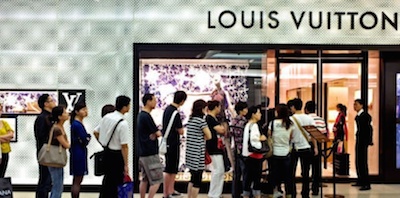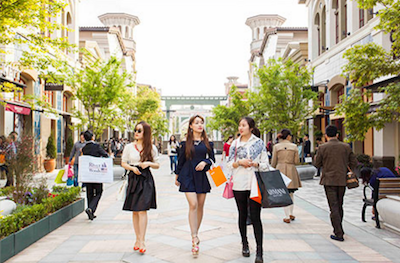 China's Generation Z are true digital natives
China's Generation Z are true digital natives
In a reversal of the more materialistic tendencies of their parents, almost 95 percent of Chinese Generation Z consumers say it is essential for brands to be sustainable and environmentally conscious, according to a report by RTG Consulting.
The continued growth of China over the next several years will ensure that its consumers remain prime targets for brands for the foreseeable future, as even a slowed China exceeds the growth rate of western nations. As a result, brands will need to make a connection to this group, the first born in a fully modern China, in the interest of long-term success.
“We have noticed that the meaning of success is being redefined where career and financial achievement are no longer the main drivers,” said Marc-Oliver Arnold, head of research and business consulting divisions at RTG Consulting Group. “Our research shows that more than 62 percent of Gen Z already believe that ‘success no longer means financial wealth’; instead, there is an emerging shift in mindset where it is more about how you live your life that matters.
“Not only does this mean they want to live a multi-faceted and enriching lifestyle, but that they also see the value in taking responsibility for caring for the world and their environment,” he said. “This awakening fuels this generation’s desire to be mindful of the present moment and rediscover the meaning of happiness in daily experiences.
“In fact, two out of three emphasized that their expectations of brands today is to ‘build genuine human connections.’ Hence, it is evident that luxury will no longer be defined by superior materials goods, but instead experiences that empower this generation in their pursuit for self-expression and elevation.”
For the report, RTG gathered survey data from 1,000 Gen Z members and had in-depth conversations with 30. Additionally, patterns of behavior and sociocultural movements were observed to further supplement the data and provide a macro-view to complement the qualitative interviews.
Generation gap
As millennials have begun to accrue wealth, they are now the target market for many brands, which recognize that making the connection could sustain several decades of good business. However, the potential of the subsequent generation, particularly in booming market such as China, is enormous.
Additionally, the present reliance on Chinese tourists, a result of the country’s enormous population and booming economy as well as laws, taxes and limitations of distribution that raise the price of luxury goods in the country, means brands must be equipped to reach these consumers when their behaviors and desires change.
 Chinese tourists lineup outside a Louis Vuitton boutique
While Chinese millennials are heavy travelers and see luxury items as status symbols, tomorrow’s Chinese consumer will more closely resemble today’s western youth, a worldly, socially conscious consumer with alternate definitions of success.
Good news for brands is that many of the techniques currently being used to court millennials, namely emphasizing sustainable measures, will prove effective on China’s Gen Z. Brands that have not yet begun to prioritize sustainability and reduce their carbon footprint and have instead banked on a globalizing economy and/or Chinese tourists will only be more pressed to adapt as time goes on.
Although environmental concerns are the largest marker of China’s Gen Z consumers, it is far from the only one. Barely a quarter of these consumers object to same-sex marriages, an opinion that is at first glance divorced from consumer culture but is in fact important to note for marketing materials, which still overwhelmingly suggest heterosexual couplings.
While “word of mouth” was and remains the best form of advertising a brand can hope for, the phrase is quickly becoming an anachronism. Only 10 percent of consumers surveyed spend more time interacting offline than online with friends.
Marketers are already going after consumers on social media, but proficiency with the various platforms and a quick adoption rate will be crucial moving forward. With interaction moving online, brands will need to find ways to generate buzz in an organic an unobtrusive way even more so than they do today.
Chinese tourists lineup outside a Louis Vuitton boutique
While Chinese millennials are heavy travelers and see luxury items as status symbols, tomorrow’s Chinese consumer will more closely resemble today’s western youth, a worldly, socially conscious consumer with alternate definitions of success.
Good news for brands is that many of the techniques currently being used to court millennials, namely emphasizing sustainable measures, will prove effective on China’s Gen Z. Brands that have not yet begun to prioritize sustainability and reduce their carbon footprint and have instead banked on a globalizing economy and/or Chinese tourists will only be more pressed to adapt as time goes on.
Although environmental concerns are the largest marker of China’s Gen Z consumers, it is far from the only one. Barely a quarter of these consumers object to same-sex marriages, an opinion that is at first glance divorced from consumer culture but is in fact important to note for marketing materials, which still overwhelmingly suggest heterosexual couplings.
While “word of mouth” was and remains the best form of advertising a brand can hope for, the phrase is quickly becoming an anachronism. Only 10 percent of consumers surveyed spend more time interacting offline than online with friends.
Marketers are already going after consumers on social media, but proficiency with the various platforms and a quick adoption rate will be crucial moving forward. With interaction moving online, brands will need to find ways to generate buzz in an organic an unobtrusive way even more so than they do today.
 Chinese consumer using WeChat
“As digital natives, China’s Gen Z currently lives and breathes mobile, and so [a brand’s] approach must be inherently mobile, with the goal of becoming part of their digital lifestyle,” Mr. Arnold said. “This means offering engaging, meaningful and inspiring creative content as well as distinct experiences.
“In addition, we foresee brands to increasingly become more of a platform for people to build deep and personal human connections.”
Perhaps most alarmingly, around half of respondents say that a more interesting job would be preferable to a high-paying job and only 11 percent agree that wealth indicates success. The overall shift from materialism to mindfulness could be a major obstacle for many sectors, which will need to find a way to tell consumers that a handbag, jewelry or a car is more than a product or sign of wealth.
Brave new world
Although this data connects China’s Gen Z to global Gen Y consumers, China’s own millennials are generally far more consumerist than those in the United States and elsewhere.
Following Gen X’s economic breakthrough, Gen Y was presented with a world in which they could buy previously unthinkable luxuries. Those born into such a world, however, have turned their attention to non-material aspects of happiness.
Chinese consumer using WeChat
“As digital natives, China’s Gen Z currently lives and breathes mobile, and so [a brand’s] approach must be inherently mobile, with the goal of becoming part of their digital lifestyle,” Mr. Arnold said. “This means offering engaging, meaningful and inspiring creative content as well as distinct experiences.
“In addition, we foresee brands to increasingly become more of a platform for people to build deep and personal human connections.”
Perhaps most alarmingly, around half of respondents say that a more interesting job would be preferable to a high-paying job and only 11 percent agree that wealth indicates success. The overall shift from materialism to mindfulness could be a major obstacle for many sectors, which will need to find a way to tell consumers that a handbag, jewelry or a car is more than a product or sign of wealth.
Brave new world
Although this data connects China’s Gen Z to global Gen Y consumers, China’s own millennials are generally far more consumerist than those in the United States and elsewhere.
Following Gen X’s economic breakthrough, Gen Y was presented with a world in which they could buy previously unthinkable luxuries. Those born into such a world, however, have turned their attention to non-material aspects of happiness.
 Value retail China
Indeed, success today for many brands offering material goods is often related to where Chinese tourists go.
For example, high sales in Western Europe and Japan led to decent third quarter results for Kering, suggesting strong business from Chinese tourists.
The Kering Group saw luxury sales increase by 14 percent on a reported basis and slightly more than 3 percent on a comparable basis in the third quarter of 2015 compared to the year-ago. Much of this improvement can be attributed to a variety of economic factors taking Chinese consumers to Western Europe and Japan, where Kering’s presence is relatively strong (see story).
However, without a consumerist Chinese culture, brands will need to offer experiences, just as those currently targeting the United States’ youth are doing.
Increasingly, affluent consumers are foregoing luxury goods for travel, with 80 percent choosing an experience over an item, according to a November 2015 report from Martini Media.
“The Martini Report, Volume 4: The Affluent Traveler” found that even from the year-ago, affluent consumers are 50 percent more willing to spend on leisure activities, and surprisingly, more women are interested in exploring than men. As one of the primary drivers of the luxury market, travel and hospitality brands can leverage this information to continue programming curated experiences for affluent guests in response to their behavior and preferences (see story).
As the experiential trend takes hold in China, marketing efforts will need to follow suit, be it new ways of promoting and selling product or striking up partnerships with those in the travel sector or other related spaces.
“Gen Z grew up in a world filled with excess, rapid acceleration of technological advancements and constant change,” Mr. Arnold said. “This is a climate that has forced them to question the meaning and value of life itself.
“Striving for a better life, this generation is experiencing a spiritual awakening that enables them to appreciate the beauty that lies in simple moments of pleasure,” he said. “They aspire to elevate everyday life to an 'art-de-vivre,' intensifying daily pleasures while searching for meaning and quality.
“They are also redefining happiness and success beyond individualism, whereby self-fulfillment should directly participate in collective well-being. Thus when they pursue their career, this generation will take a company’s social responsibility history into serious consideration as they see things bigger than themselves. By doing so, they will advance a progressive attitude within which individuals are free to follow a diversity of paths or to forge their very own, hence being unique, connected, informed and most importantly empowering.
“These are all ‘watchwords’ that will define the success of the brands of tomorrow. If not, brands will likely lose their relevance with this new wave of well-informed and sophisticated contemporaries.”
Value retail China
Indeed, success today for many brands offering material goods is often related to where Chinese tourists go.
For example, high sales in Western Europe and Japan led to decent third quarter results for Kering, suggesting strong business from Chinese tourists.
The Kering Group saw luxury sales increase by 14 percent on a reported basis and slightly more than 3 percent on a comparable basis in the third quarter of 2015 compared to the year-ago. Much of this improvement can be attributed to a variety of economic factors taking Chinese consumers to Western Europe and Japan, where Kering’s presence is relatively strong (see story).
However, without a consumerist Chinese culture, brands will need to offer experiences, just as those currently targeting the United States’ youth are doing.
Increasingly, affluent consumers are foregoing luxury goods for travel, with 80 percent choosing an experience over an item, according to a November 2015 report from Martini Media.
“The Martini Report, Volume 4: The Affluent Traveler” found that even from the year-ago, affluent consumers are 50 percent more willing to spend on leisure activities, and surprisingly, more women are interested in exploring than men. As one of the primary drivers of the luxury market, travel and hospitality brands can leverage this information to continue programming curated experiences for affluent guests in response to their behavior and preferences (see story).
As the experiential trend takes hold in China, marketing efforts will need to follow suit, be it new ways of promoting and selling product or striking up partnerships with those in the travel sector or other related spaces.
“Gen Z grew up in a world filled with excess, rapid acceleration of technological advancements and constant change,” Mr. Arnold said. “This is a climate that has forced them to question the meaning and value of life itself.
“Striving for a better life, this generation is experiencing a spiritual awakening that enables them to appreciate the beauty that lies in simple moments of pleasure,” he said. “They aspire to elevate everyday life to an 'art-de-vivre,' intensifying daily pleasures while searching for meaning and quality.
“They are also redefining happiness and success beyond individualism, whereby self-fulfillment should directly participate in collective well-being. Thus when they pursue their career, this generation will take a company’s social responsibility history into serious consideration as they see things bigger than themselves. By doing so, they will advance a progressive attitude within which individuals are free to follow a diversity of paths or to forge their very own, hence being unique, connected, informed and most importantly empowering.
“These are all ‘watchwords’ that will define the success of the brands of tomorrow. If not, brands will likely lose their relevance with this new wave of well-informed and sophisticated contemporaries.”
